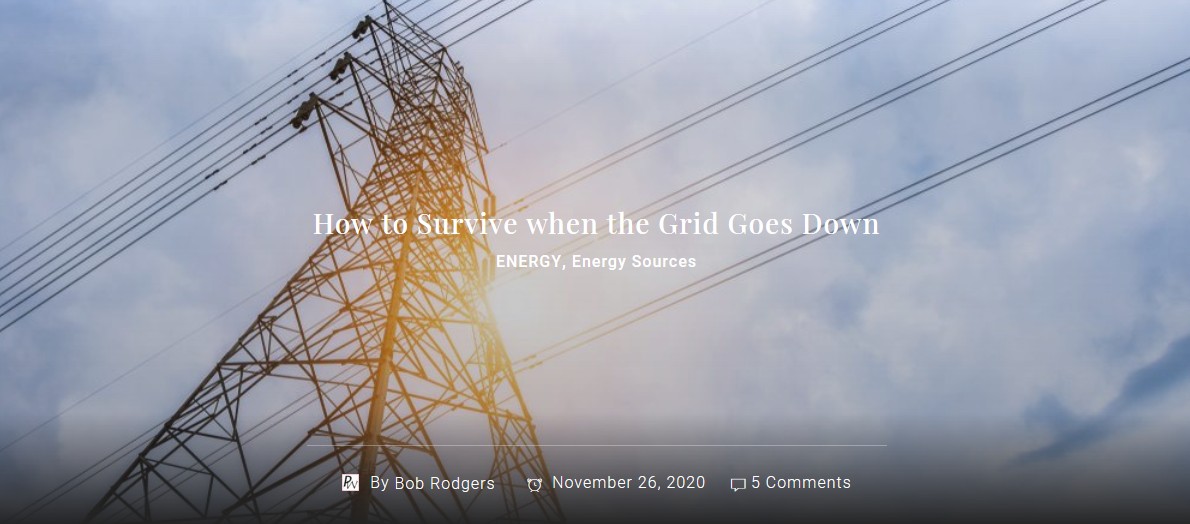👉 Insightful Knowledge from the Field of Master Mind Survival (MMSUR) 📡
From the research of: Joseph Mercado 👨
Article Author: Bob Rodgers 👴
Content Contributor: Survivopedia 🌎
To: Survivalist 🔋
Blog Post #1091 📌
Re: When the Grid Goes Down ⏬
Date and Time: Saturday, November 28, 2020 at 6:12 p.m. ⏰
Dear Survivalist,
The vulnerability of our national power grid is probably the most serious threat to our existence, and if it goes down, it can be even deadlier than the current pandemic.
When the power goes out, and people are left without electricity for long periods of time, they will panic, and things may never turn back to normal.
Can you and your family survive a grid-down event?
The life we have today is being taken for granted, and we don’t really think about how easy we have it.
We are used to pressing a button, and any gadget or appliance magically starts to function.
We live in an age where everything is being handed to us, and we cannot imagine living without certain “human rights” like heat, air conditioning, and readily available food.
We seem to forget that our addiction to the power grid also makes us vulnerable.
And regardless if you depend on the Eastern grid, the Western Grid, or the Texas one, you are vulnerable to all sorts of threats.
We totally take these systems for granted, and people are not aware that a grid-down disaster is a matter of when not if.
How can a grid-down event occur?
There are all sorts of scenarios that can shut down our power grid for good, and entire books have been written on the subject. There are so many things that could go wrong, but three major threats are currently considered by our government. These are as follows:
Terrorist attack:
A terrorist attack on vulnerable points of our power grids can halt the distribution of electricity to entire states. Such attacks can be either physical, involving all sorts of explosives and other means to cause extensive damage, or technological/digital attacks.
Nowadays, terrorists are using hackers to cripple down entire networks, and they no longer need to use traditional weapons to cause chaos.
A recent cyber-attack on a German hospital managed to shut down the entire hospital, and a patient that was undergoing surgery died.
This is just an example, but it helps us understand the bigger picture.
Solar storms:
NASA has been making noise for years about solar storms and how a coronal mass ejection (CME) can cause irreversible damage to our power grids.
However, although this subject has been debated, and it was explained in so many details that even a five-year-old could understand it, nobody seems to be paying attention.
This is not something new, and such events have occurred before in our history.
EMP weapons:
An EMP attack is the most probable scenario for our government, and they have been preparing for it since 2010.
The government has admitted that they have taken precautionary measures to protect the military installation and other strategic objectives.
At some point, there was even a documentary going on online showing people how an EMP device no bigger than a suitcase can shut the power down in a city like NY without nobody suspecting anything.
Another potential problem that seems nobody is thinking about is people.
More precisely, the staff working to keep the power grid operator.
During a major SHTF event, there’s a chance that most of these folks will abandon their post to be with their families.
If you think about the level of interconnectivity and the level of dependency of our power grid that has grown exponentially since the 70s, you can imagine that once the power grid goes down, it will be hard to bring it back up without the right manpower.
The grid goes down, now what?
When the electricity stops, the world stops. It is as simple as that, and everything that runs on electricity (water, heating, communication, fuel, etc.) will stop functioning.
In two to three days, you will be left without water. And while you might have enough water stored to lasts you for a few months, you’re probably missing the big picture.
How about the sewage, the thing we take for granted that keeps our world clean?
Problems with sewage are likely to occur practically immediately, and it will become a public health nightmare in no time.
People will wind up fouling the creeks and rivers, and eventually fouling all the water supply that others could be drawing from.
And considering those water sources that still remain unpolluted, people will not only have to figure out ways to transport water from such areas, but they also have to figure out ways to filter it and make it potable.
This shouldn’t become a problem for a family or two, but if you think about it on a larger scale, you will soon understand how such a task is almost impossible to achieve.
As time goes by, things will get worse…
You go past day three to one week, and a cascade of events will start to unfold since our advanced society dependent on technology can no longer function and sustain itself.
Another issue besides water and sewage will rise in homes that use natural gas for heating, cooling, or cooking.
It goes without saying that those using electricity for such needs are out of luck, but even those dependent on gas, won’t be any luckier.
First of all, we have to acknowledge that natural gas is electrically pumped and just a small percentage of the population has natural gas being sent to their homes by natural pressure.
The vast majority of Americans depend on some sort of pressure station to pump their gas, and those stations won’t work without electricity.
And second, even if you are one of the lucky ones depending on natural pressure to have gas delivered, the pressure in those gas lines will drop, and domestic residences will be out of natural gas in a matter of weeks.
The food is gone:
The logistic systems, the core of all supermarkets across our country, will fail one by one, and readily available food from your area could be gone in less than a week (depending on how quickly the people wake up).
Most of our modern grocery stores are not stocked like in the old days, and what you see on the shelf is probably most of the stuff they have.
They may have additional supplies in the back, but they don’t have warehouse-like storage.
They are dependent on an inventory system controlled by both man and machine that schedules deliveries and updates the inventory almost in real-time.
Once the system fails, the shelves will go empty. No auto-reordering, no scheduled deliveries, and eventually, orders will stop coming in.
The list can go one, and there will be a vast amount of issues that will occur when the power grid goes down.
There just isn’t enough space to cover all of them in a single article. However, we can look at a few things we can do to prepare for such an event.
There are a few things to consider for such a scenario:
- Making enough physical room in your living space to store water and food long-term.
- Practice cooking and preparing the food you are storing so that you can be used to it. In certain cases, it will be quite different than the food you are currently eating. Since ordering food is out of the question, you will have to make do with what you’ve stored.
- Learn about self-defense and participate in weapons training.
- Learn and figure out ways to deal with medical needs. Some of these methods may be improvised alternatives to what we are used to (similar to what they are doing in 3rd world countries).
- Understand the value of your health and the shape you’re in.
- Invest time and patience in your projects.
Take some time and think about this and wrap your hand around the “why” and “how” to prepare for a grid down event.
You first have to start by preparing your mind because it is not a simple process envisioning such a scenario.
Where to start?
By this time, as a reader of Survivopedia, you should know that there are a vast amount of resources available both here and out there on the internet.
There are basic survival needs to be broken down to the basics by various survival experts.
Let’s go with the obvious top priorities:
Water:
This is the number one priority for most people out there, and potable water will be hard to find after a grid-down event.
Even if you are storing just a few containers with tap water, you will be way more prepared than the vast majority of your neighbors.
The limitations you will have to face are strictly related to where and how you live. For example, how you can acquire water depends a lot on where you live.
If you live in an apartment, your water collection projects may be limited compared to someone living in a suburban home.
Once your supply runs out, you have to figure out ways how to collect rainwater and tap into various other water sources inside or outside your apartment.
Having a few water filtration methods on hand will not hurt, but not being able to identify a water source in your vicinity will make them useless.
Take the necessary time to figure things like this out since you won’t be able to rely so much on water storage if you have limited living space.
Food:
Food becomes your second priority, and this will always be a constant concern, no matter how well prepared you are.
There is a vast amount of information and videos on the internet covering everything from what to store, to how to do it properly and how to prepare what you’ve stored.
However, the main thing you have to figure out first is how and what your budget can handle.
You need to work with the money you have without neglecting other priorities (rent, bills, etc.).
Also, the storing space once again may work against you.
When it comes to food storage, you have to be creative and figure out ways to store your food properly, plan last-minute shopping trips when it hits the fan, and even plan caches if you have to. Once you get started with this, all sorts of ingenious ideas will start to pop out.
Security:
No matter how you look at things from a prepping perspective, the human element will always become the main concern regarding your safety.
You’ve seen how people are acting during “protests” and when things begin to unfold (how they emptied shelves in supermarkets when the pandemic started).
If you happen to live in a city or large suburb and you are trying to get back home from the last-minute shopping trip, the chances are that someone will walk up to you, pull out a weapon of some sort and claim what you just bought as his.
This is a simple example, but the point here is that security and self-defense become a priority in a grid-down event or any SHTF event for that matter.
In a survival situation, owning a few guns and knowing how to use them will be much more practical than trying to reason with unreasonable people.
You’ve got to practice with the tools you have, and the training should be more extensive than the classical shooting stances.
Training is mandatory with every tool you have, every vehicle, and whatnot, because in times of need, everything around you may be used to assure the safety of you and yours.
Fuel needs:
When the grid goes down, obviously, the fuel logistics will soon follow.
When that happens, people will need to rely on their fuel supply, and if you don’t know how to stock up fuel properly, you will have to find alternative ways of traveling.
Just as with other storage situations, there will be some limitations you will have to face.
There are a few points you need to learn regarding storing fuel (where, how much, until when, etc.) because you can’t just cram a few gasoline canisters in your home and hope for the best.
The main thing you have to acknowledge is that shelf-life plays an important role when planning a gas cache or storage.
Gasoline is quite problematic since it doesn’t have a very long shelf-life. You can go with diesel since it has a fairly high flash point and isn’t as dangerous as gasoline if a gunman attacks your home. Not to mention that if bugging out is your main plan, fuel will become a top priority.
Medical supplies:
At a minimum, every prepper should look into taking all the American Red Cross courses.
This would include a CPR class, basic first aid classes, advanced first aid classes, etc.
These are essential lessons for survivalists, not only for a grid-down disaster but for any scenario that can cause a medical emergency.
Enroll yourself and inspire relatives to enroll in the local volunteer fire department or rescue/EMT service.
This will help you to get some amazing training that will be invaluable during an SHTF event.
Another thing to think about (far ahead of time) is what will happen if you or someone you know is on a CPAP machine or suffers diabetes or kidney dialysis.
Regrettably, if the grid fails, some folks are going to be put in a very hard place.
Not everyone is equipped with a battery-powered CPAP machine.
Between kidney dialysis and other chronic medical conditions, if we have a major disturbance, we are going to be looking at a very high die-off rate.
The numbers will be boggling.
The main point here is that your health plays an important role during a crisis, and not only do you have to get all the medicine you require, but you will also need to be in shape.
Living properly and creating a vigorous lifestyle should be done now before the time comes, and you will be put to the test.
No matter what you do to get your life on track, understand, that good physical condition is crucial during an emergency.
We have become a soft society that is used to spend more and work less.
Rather than always paying for help, try to do things yourself, even if it involves a lot of sweating.
Communication:
Having the means to communicate will be crucial since you will be able to coordinate with friends, family, and neighbors.
Getting MURS ban radio is a smart thing because such devices are multiple user radio systems.
Most people will cover the CB channel, while the MURS band will be lightly used.
Another advantage of owning such a radio is that the MURS frequency is right next to the National Weather Service Alert frequency.
It’s not only about the gear.
While some of the priorities listed above will make your life easier if the grid goes down, it’s not always about hoarding stuff.
More than 80% of your survival depends on the skills and knowledge you’ve obtained and how you’ve managed to practice what you’ve learned.
When people make lists with stuff to buy, I tell them to first figure out the mess between their ears.
There’s no point in acquiring gear if you don’t know how it should be used and if you cannot use it to its full extent.
There is a learning curve to each thing you obtain, and the gear you bought will not use itself, and it most certainly will not coach you during an SHTF event.
Concluding:
Getting supplies is a smart thing to do. Learning how to use those supplies and every piece of gear you have is mandatory, but that’s not all.
I would advise you to learn as much as you can about “old-time” technology and figure out alternatives to your modern appliances and anything else that offers comfort during a grid-down event.
This could be what it takes to save your family during a grid-down event.
Written by Bob Rodgers:
Bob Rodgers is an experienced prepper and he strives to teach people about emergency preparedness.
He quit the corporate world and the rat race 6 years ago and now he dedicates all his time and effort to provide a self-sufficient life for his family.
He loves the great outdoors and never misses a chance to go camping. For more preparedness related articles, you can visit him at Prepper’s Will.
Content Source: Survivopedia.com

 Email Us a Message
Email Us a Message 

Please send us an email message below and we will serve you momentarily.




 Fly Over to the MMU Facebook Page with Hoot
Fly Over to the MMU Facebook Page with Hoot 

 Join the MMA Facebook Group Today
Join the MMA Facebook Group Today 